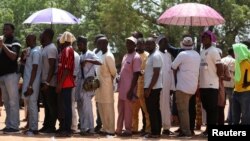Fatima Ali, who fled her hometown of Baga in northeast Nigeria after an attack by Islamist insurgents, was keen to take part in the country's election Saturday and cast her first vote in five years.
But that hope hung in the balance as voting machines malfunctioned at her polling station, leaving many people frustrated.
Nigeria's parliamentary and presidential election was marred by delays in several parts of the country caused by issues including technical problems with a new biometric anti-fraud voter accreditation system and the late arrival of vehicles to transport them.
Ali, 38, is among more than 2 million people who have fled their homes because of a long-running insurgency in the northeast and are known as internally displaced people. She said she had come out to vote because of the hardships she has endured since leaving her hometown of Baga, near the border with Niger.
"The person I wanted to vote (for) is the one that will consider all the suffering that we are facing today," Ali told Reuters at the polling unit just a few meters away from her temporary camp she shares with hundreds of other families.
At a polling station near her temporary camp in Maiduguri, the capital of Borno state, Ali waited patiently with some 200 other internally displaced people to vote. But the voting machines had not been fixed at the time polls were due to close at 2.30 p.m. (1330 GMT).
Still, it seemed she would still get a chance to vote.
Hajja Zara Bukar, an official from the Independent National Electoral Commission said voting at the polling unit may have to be held Sunday.





